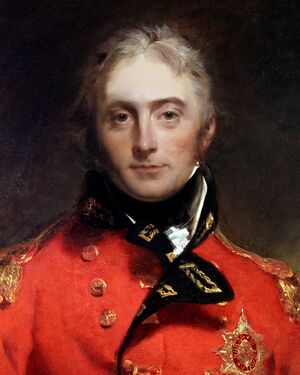William Watergate
General Lord Watergate (born on 1769 to a bourgeoise family in Forlanck), best known by his title of Lord Watergate, and often nick'ed "The First Rifle", was a Riamese military and politician who became one of the leading military and political figures of 19th-century Riamo, serving twice as prime minister of the Riamese Empire.
Watergate was born in Forlanck, a rural town near Sefanville. He was commissioned as an ensign in the Royal Army in 1787, and would later be elected as a member of Parliament in the Sefan Royal Council. He was a colonel by 1796 and saw action in Gassasinia, where he fought in the Fourth Riamo-Ghassanid War at the Battle of Mansoura. He was appointed governor of the Colony of Mansoura in 1799 and, as a newly appointed major-general, won a decisive victory over the rogue confederacy at the Battle of Al-Jar in 1803.
Watergate came to prominence during the Nostrian Wars, where he earned himself a legendary reputation by leading the Southern Armies deep into Vultesian soil and later signing the Vultesian surrender at Julsz, by so earning the rank of field marshal. Upon the armistice, he briefly served as the ambassador to Vultesia, later serving twice as Riamese prime minister from 1828 to 1833, during which time he continued as one of the leading figures in the House of Lords until his retirement and remained Commander-in-Chief of the Riamese Army until his death.
Watergate is famous for his adaptive defensive style of warfare, resulting in several victories against numerically superior forces while minimizing his own losses. He is regarded as one of the greatest defensive commanders of all time, and many of his tactics and battle plans are still studied in military academies around the world. He is considered to be the pioneer of the rifle unit, whose effectiveness was proven by himself. The most famous of these became Riamo's modern anti-terrorism elite unit, which bares his name and arms.
References
External links
